Applied Research
The HKIMR released a new Applied Research report on Demographic Changes and Long-term Asset Markets: Opportunities and Developments in Hong Kong in February 2022.

 History would probably see Q1 2022 as
an epoch moment. The crisis in Ukraine and the sanctions on Russia are not only a watershed
in global geopolitics, but could also accelerate some structural changes in the global
financial architecture. The surge in commodity prices has worsened inflation, shifted
interest rate expectations and raised concern about the negative impact on many emerging
economies. These developments together with the uncertainties in regulatory policies in
number of business sectors in Mainland China have resulted in heightened market volatility.
Locally, the Omicron virus has sadly caused the loss of a lot of lives and much disruption
to the daily lives of the people in Hong Kong.
History would probably see Q1 2022 as
an epoch moment. The crisis in Ukraine and the sanctions on Russia are not only a watershed
in global geopolitics, but could also accelerate some structural changes in the global
financial architecture. The surge in commodity prices has worsened inflation, shifted
interest rate expectations and raised concern about the negative impact on many emerging
economies. These developments together with the uncertainties in regulatory policies in
number of business sectors in Mainland China have resulted in heightened market volatility.
Locally, the Omicron virus has sadly caused the loss of a lot of lives and much disruption
to the daily lives of the people in Hong Kong.
Despite these challenges, Hong Kong’s financial markets have continued to function smoothly.
Our Members have demonstrated their dedication to serving customers, protecting the safety
of their staff and supporting the community. I trust that with the collective resilience and
determination of the community, and the immense contribution of our medical professionals on
the frontline, Hong Kong could recover soon.
On the part of the AoF, we had to cancel our Chinese New Year Reception and have switched
immediately to a full virtual mode in all our activities. The webinar with Shriti Vadera,
Chair of Prudential plc moderated by Dr Moses Cheng on 15 March was very well received. Our
next major event on 12 April will feature Mr Joseph Yam, former Chief Executive of the HKMA
and Prof Huang Yiping of Peking University. Over 1,000 people have signed up a few days
after we issued notification about this event, showing the high level of interest on the
subjects to be discussed, notably the development of the offshore RMB market in Hong Kong.
There will also be another prominent speaker, Prof Michael Spence, Nobel Laureate in
Economics and an International Adviser of the AoF, who will speak to us on 3 May. Prof
Spence will discuss some of the global geopolitical-socio-economic paradigm shifts that are
happening around us. I look forward to welcoming you in these webinars.
Our newly-launched Financial Leaders Programme (FLP) is very well received. Out of the many
highly-qualified applicants, 20 have been admitted for the 2022 inaugural cohort. They are
all nominated by their firms’ CEOs to go through a structured and intensive leadership
development journey from April to December this year. Meet these 20 rising stars in the FLP
section of the AoF website.
The HKIMR, AoF’s research arm, released a new report on demographic changes and long-term
asset markets in February. Contrary to public perceptions that ageing would lead to
drawdowns in retirement funds and a reduction in overall savings, one key point highlighted
in this report is that Hong Kong’s ageing demographics in the coming years would lead to a
further increase in demand for long-term assets. The report, together with other HKIMR’s
research work, can be downloaded from the HKIMR section of the AoF website.
To promote more sharing and interactions amongst Members, we have invited Eric Hui (Zurich
Insurance) and Sammie Leung (PwC) to contribute articles on the topical issue of green and
sustainability finance to this Quarterly e-Newsletter. These articles have also been posted
on the AoF
website. If you
would like to
contribute your thoughts and insights to future issues of our e-Newsletter, please get in
touch with us.
Kwok-chuen Kwok
CEO, Hong Kong Academy of
Finance
March, 2022.

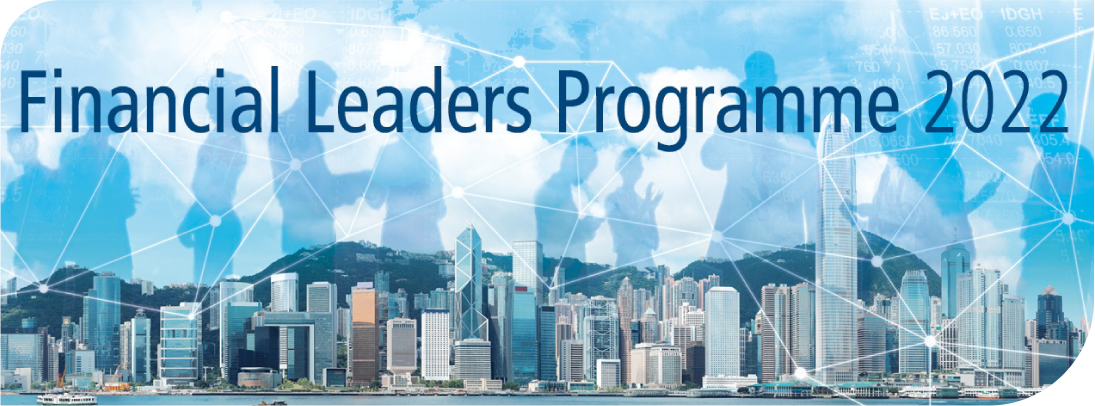
This newly-launched Programme is designed to nurture the next generation of senior financial leaders for Hong Kong. It attracted a lot of applicants who have to be nominated by their CEOs. A total of 20 highly-qualified financial talents have been selected from different financial sub-sectors to participate in the Programme from April to December 2022 on a part-time basis. Details of the 2022 Cohort are available at https://www.aof.org.hk/flp/participants/2022-cohort.
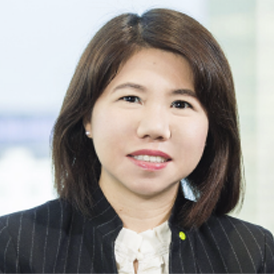


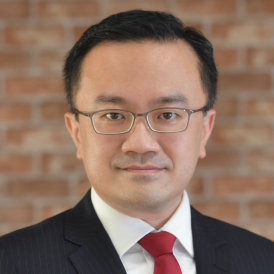







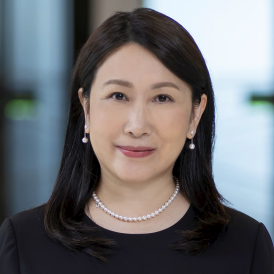
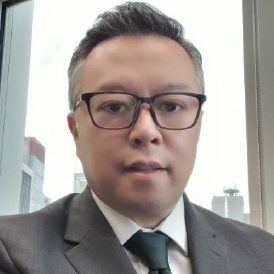









The AoF held a webinar on 15 March 2022 under our Distinguished Speakers Series, featuring
Shriti
Vadera, Chair of Prudential plc. Dr Moses Cheng, Fellow of AoF and founder Chairman of
Insurance
Authority, moderated the webinar.
Following Pru’s 2021 results announcement the previous week, Shriti outlined the strategic
directions
and risk management approaches of the insurance giant. Apart from offering macro and
historical
perspectives on the pandemic, emerging markets, China and Hong Kong, fintech, and green &
sustainability etc., Shriti also reflected on her own career, stressed the importance of
inclusion and
diversity, and shared her vision for Royal Shakespeare Company.
Over 200 senior executives from the financial services industry and regulators joined the
webinar.
Impressed by the wit and wisdom of Shriti, the audience engaged in a lively discussion with
her.

AoF Members raised questions in the Q&As session. (Top) Ms Luanne Lim, Chief Executive Hong
Kong of The Hongkong and Shanghai Banking Corporation, (Left) Mr Thomas Cheong, President of
Principal Asia, and (Right) Mr Michael Chan, Co-CEO of Bowtie Life Insurance
Company.


Committed to green insurance and supported by insurance industry leaders, The Hong Kong Federation of Insurers (HKFI) established the Task Force on Green Insurance (the Task Force) in 2020, and has been engaging the HKFI members through webinars on best practices in green insurance. The Task Force has also connected with various stakeholders, e.g. The Green Finance Association and The Hong Kong Observatory, and is currently working with the Centre of Green & Sustainable Finance under the Cross-Agency Steering Group in the capacity building and data working groups.
Looking ahead, the Task Force will team up with an appointed consultant to build an industry charter, to facilitate the work on disclosure framework, and to propose a data management structure for data use across industries.
On the macro policy-making level, inter-governmental agencies have to make use of data for measurements and form their frameworks, policies or targets. Similarly, country governments develop their Nationally Determined Contributions (NDCs) based on data, and accordingly assign emission targets across trades within their economies.
In Zurich Insurance Group, one major application of data is the approach we structure our targets and strategies when making our impact investment which stood at USD5.8 billion in 2020 and helped avoid 2.9 million metric tons of carbon emission. By 2025, we aim to decrease carbon intensity in our listed equity and corporate bond investment by 25%, and by 30% in our direct real estate investments. It is all science and data behind the formulation and execution.
When working on climate risk governance and related disclosures, we very often bump into a number of data gaps, e.g. carbon footprint of SME’s, catastrophic damages by geospatial level, etc. Industries and corporates, along with our regulators, are working on such gaps by leveraging publicly available data and private service providers. It is indeed the opportunity for relevant consultants and startups to find their growth path by providing new data-related services for closing the gaps. As such, talents in the disciplines of ESG and climate data are welcome. Managing weather-related risks to sustain economies for the coming century is a core competence of the insurance sector. The insured loss data, catastrophe modeling, risk surveys and analysts of the industry will be tapped on for enriching the data required for climate risk management.
All businesses can set operating targets for decarbonisation. It could be as simple as reducing the real estate footprint, the use of fossil-fuel power and air travel. In particular, insurers can do a great deal in digitalisation to reduce the use of paper. Trees are just indispensable to decarbonisation. With this belief, Zurich Insurance Group is running a major reforestation project in Brazil for alleviating carbon emission and preserving life species.
As a global risk management center and insurance hub, Hong Kong aims to be a preferred Insurance Linked Securities (ILS) domicile. The ILS market has got a very good start with its first catastrophe bonds issued, and is expected to grow with rising business opportunities in the region and along with the Belt & Road Initiative.
In the coming decade, we will see more new materials, new technology, new energies or new supply chains as driven by the “net zero” transition among various industries. Property and Casualty insurers are there to cover their clients’ risks arising from such transition processes.
Life and Savings insurers are no less important as they are instrumental to the sustainability of our community by promoting health, savings and annuity products. Insurers have been actively adding more ESG funds to their Investment-Linked Assurance Schemes (ILAS) products. Going forward, such ESG-based ILAS should be qualified under the Wealth Management Connect Scheme of the Greater Bay Area. Given the strength of the industry’s distribution capability, such qualification will certainly draw more investment toward the green movement.
There are so much more Hong Kong insurers can do, together with other financial sectors, to promote green and sustainable finance for our brighter tomorrow.
The above article only reflects the opinion of the writer and does not represent the positions of the Hong Kong Academy of Finance.


Climate change has emerged as a key agenda item for business and political leaders around the world. Climate risk management and decarbonisation have also gained a lot of traction in both the public and the private sectors in Hong Kong. Policymakers, banks, investors and insurers have been finding ways to help address climate-related risks, many of whom are also making efforts to re-strategise and reinvent their business models to take advantage of the opportunities arising from the green movement.
Leveraging Hong Kong’s status as an international financial hub, policymakers have taken a number of proactive measures to drive the climate agenda, not only to ensure the stability of the city’s financial systems but to also maintain its competitiveness. The Green and Sustainable Finance Cross-Agency Steering Group1 is keen to strengthen Hong Kong’s leading position in the green finance space.
Several climate-related regulatory requirements came into effect in 2022. Banks and asset managers are expected to incorporate climate risk factors into their money lending and investment decision-making processes2 . Listed issuers3 are also required to disclose their risk assessment process and the actions taken to address climate-related risks. The push from regulators has undoubtedly been effective in urging corporates to take a closer look at climate risk management.
Investor demand is another driving force behind the climate agenda. Integrating ESG factors into investment decision-making is no longer a novel or just a ‘nice-to-have’ concept. It has become part and parcel in the investment space, and many institutional investors believe ESG and climate factors help them generate alpha and manage beta. Fund managers such as BlackRock and SSGA issued updates on their 2022 voting policies to emphasise climate and net-zero transition, as well as board diversity. The rise of shareholder activism is also notably seen in the success of investment group Engine No.1 last year in garnering shareholder support to ultimately replace a quarter of Exxon Mobil’s board with new directors in support of ESG movements. BlackRock also forecasted that 20% of all its ETFs will be tied to ESG ratings by 2028.
I have seen an uptrend in the issuance volume of green or transition-themed loans and bonds. Not only do banks now play a key role in providing capital to enable and accelerate decarbonisation on a transactional level, some have even gone the extra mile in collaborating with climate solution providers to assist their corporate clients in their decarbonisation journey. Financial institutions are also taking steps to phase out coal-related activities. For example, DBS, Bank of China and AIA have all announced their timeline and plans to terminate the financing and underwriting of coal-mining and coal-fired power projects.
My consultancy work has given me the front-row seat to witness the tremendous developments in the ESG space in recent years. In particular, our finance sector is gradually accumulating the knowledge and capabilities needed to identify, understand, assess, measure and formulate responses to climate-related risks. Quite a number of industry practitioners are already benefiting from the early mover advantage in ESG financing and enabling the real economy by facilitating the transition to a lower-carbon business model. Lastly, the climate movement has created tremendous opportunities for practitioners of all levels and roles, helping them achieve business success and personal growth while doing good for the planet.
The above article only reflects the opinion of the writer and does not represent the positions of the Hong Kong Academy of Finance.

The HKIMR released a new Applied Research report on Demographic Changes and Long-term Asset Markets: Opportunities and Developments in Hong Kong in February 2022.
The key takeaways of the report are:
Demographic changes in Hong Kong will lead to an increased demand for long-term assets by up to 32% over the next 30 years, with an increasing share of demand from customers after retirement;
Market participants in Hong Kong see growth opportunities in several key areas amid the demographic transition. For example, 83% of the respondents would move towards ESG adoption in their investment strategies and 89% would consider the GBA initiatives in their strategic plans; and
Encouraging broad participation of institutional and retail investors and capturing opportunities arising from key trends are important themes to promote a healthy development of Hong Kong’s long-term asset markets.

The full report can be viewed here.

In March 2022, four Applied Research papers exploring topics that are relevant to market participants and regulators in Hong Kong were published. These papers are related to Fintech, climate risks, and recent developments on the microstructure of financial markets.

"Banks are able to maintain their information advantage, and therefore growth, by exploiting the synergies between both sides of their balance sheets through technology adoption."

"We construct measures of firm-level climate risk exposure using natural language processing techniques… Firms with high exposure to Disaster experience a decrease in sales and profitability."

"We find limited evidence of a direct relationship between margin levels and stock liquidity...The fact that the Hong Kong markets did not suffer the same extreme dislocations [during the COVID-19 pandemic] as its global peers may be attributable to the existence of individual stock futures and their diverse group of market makers."

"Our evidence suggests that lead market makers matter in ETF mispricing comovement because they are subject to capital constraints when correcting mispricing."
The executive summary and full text of the four papers can be viewed here.

Since last December, the HKIMR has published the following studies on relevant topics in monetary and financial economics:
Is the Cost of Corporate Debt Influenced by ESG Factors? Evidence from the EMEAP Region
(by Angela Sze, Iris Tang, Winnie Li and Ip-Wing Yu)Big Techs vs Banks
(by Leonardo Gambacorta, Fahad Khalil and Bruno M. Parigi)Stock Liquidity Shocks and Banks' Risk-Taking Behaviour
(by Nan Hu)All HKIMR working papers can be viewed here.

HKIMR Webinar – “The Impact of ESG Rating on the Asymmetrical Volatility-Return Relationship: Early Evidence from a Weight-Tilted Hang Seng Index” on 14 January 2022 by Joseph K. W. Fung, Hong Kong Baptist University

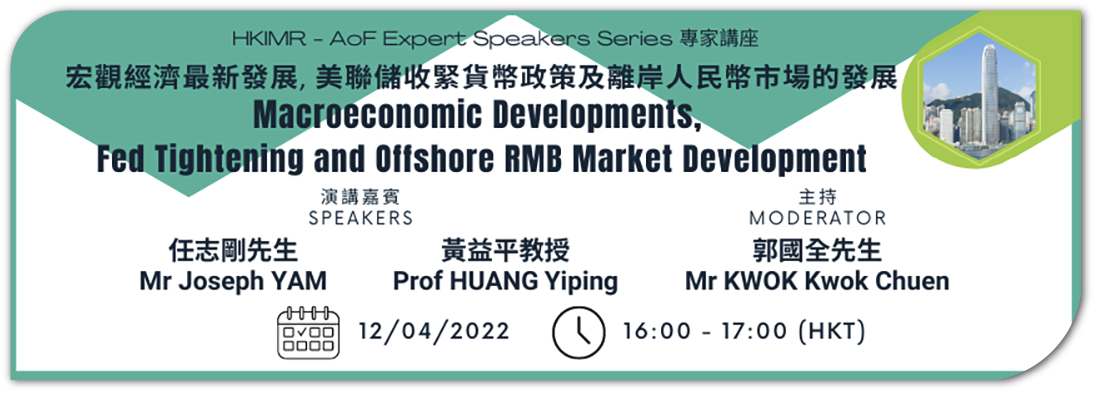

Speakers:
Prof Huang Yiping
Sinar Mas Chair Professor of Finance and Deputy Dean of
the National School of Development, Peking University
Mr Joseph Yam
Non-official Member, Executive Council
Fellow, AoF
Moderator:
Kwok-chuen Kwok
CEO, AoF
Registration:


Speaker:
Prof Michael Spence
Nobel laureate in economics

Moderator:
Mr Norman T.L. Chan
Senior Adviser, AoF
